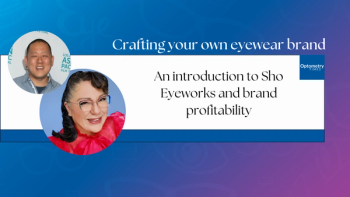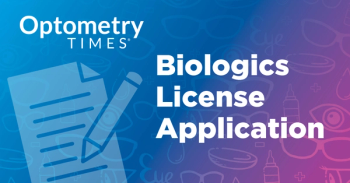
- Vol. 10 No. 05
- Volume 10
- Issue 5
Jeffrey J. Walline, OD, PhD-Associate dean for research, The Ohio State University College of Optometry
Jeffrey J. Walline, OD, PhD, discusses working with kids, myopia, and In-N-Out Burger.
Where did you grow up?
I grew up in the northeastern corner of Colorado in a town that has about 1,200 people. My dad was a farmer, my mom was a secretary/housewife. It was a great place to grow up, but it’s not where I want to live. I will admit I was not the best farm child-I’ve never driven a tractor. I avoided that as much as possible and grew up knowing that I wanted to go to California to college. My plan was to go to UCLA and play basketball, but I realized while growing up that was never going to happen. I didn’t have the ability by any shape or means.
What attracted you to academia and not private practice or industry?
I went to optometry school thinking I was going to open a pediatric practice. In undergrad I worked in a daycare center for two-and-a-half to five-year-olds, it was one of the best jobs I’ll ever have. Early in optometry I did a program funded by the National Institutes of Health called a T35 program; it introduces students to research. I fell in love with what I was doing. It was during my second year in optometry school that I wanted to go to graduate school and become an academic.
Why contact lenses?
Contact lenses interest me the most because ODs can not only diagnose complications associated with them but treat them. For me, contact lenses are ultimately important because I don’t like wearing glasses. I want other people to have that same opportunity. Some of the side effects from contact lenses may keep us from becoming near-sighted, which is my other interest. It all goes hand-in-hand: I get the pediatrics, I get the optometric care that I want, and I try to keep people from becoming near-sighted, all in one fell swoop.
Previous Q&A:
Why pediatric vision and myopia?
I am interested in pediatric myopia because I am a myope, but mostly because I get to work with kids, and I find that really rewarding. I don’t have kids of my own, so this is how I interact with kids and have a lot of fun while doing work. Every child is completely different, and you don’t know when they might melt down at any given time. My trick is make them think they’re having fun. I’m always joking with them, I’m always keeping them engaged. I don’t necessarily tell them what’s coming-I just do it and try to keep them from becoming anxious. A lot of people like to use more empathy or offer more education with the children. I like to let them have fun and get as much information from them as we can while they think they’re having fun.
What’s the worst thing that happened while a child was in the chair?
I was trying to get a child’s attention on a target. But he wouldn’t focus on that particular target. Soon, he said, “I don’t feel very well,” and I said “Oh, you’re okay! This will just take a few minutes. You can get through this.” Within the next five seconds, he threw up all over me. [Laughs] It was go wipe off what you can and keep on working.
What is the future of myopia control?
I don’t know what the future of myopia control is, but the good news is there are lots of options available to us today. We’re using soft multifocal contact lenses, corneal reshaping contact lenses, and low-concentration atropine. So far, these are beneficial. What I hope it gets to at some point is that we can prevent the onset of myopia. That would help keep the side effects of myopia from happening and make people much happier. I realize that will put optometry out of business by and large, but it’s a great goal for us to shoot for. Do I ever think we’ll get there? Probably not, but it’s something we ought to attain if we want to treat our patients the best way that we can.
What excites you about research?
Finding out the answers before we know what the answers are is very exciting. My research is something I hope people can read one day and put into practice the next. I like traveling around the world talking to people about the different aspects of research that we do, and I like being able to improve the care of children, helping people realize that children are capable of independent contact lens wear. To me it’s about finding the answers and educating optometrists.
What’s something your colleagues don’t know about you?
Most colleagues who look at me would never guess that I teach spin classes a couple of times a week. I don’t look like that fit athlete, but I do enjoy teaching spin classes. I teach spin classes because I want to be able to play my own music. People can tell when I graduated high school based on my music alone. Most spin teachers play a lot of electronica, dance, and hip hop; I am geared toward ‘80s and alternative.
What’s something you would change about optometry as it stands now?
Unify the forces. We seem to fractionate and think that we can separate into about 100 different groups which compete with each other. I wish we could all come together and work as a unit because we’d be a much stronger force if we would do so.
Related Q&A:
What’s so great about In-N-Out Burger?
[Laughs] It’s the perfect hamburger. It is just fresh, plain and simple. There’s no better burger than that. I used to like knowing the secret menu but it’s not so secret anymore since it’s on the Internet. I’ve taken $80 cab rides to get to In-N-Out Burger, I’ve driven for two hours just for In-N-Out Burger. I go to my family reunion primarily to get In-N-Out Burger. It’s truly an obsession. And when came to graduate school, I tried to bring a franchise to Ohio, but it’s family-owned; they don’t franchise. They’re coming to Colorado-there’s going to be one about two miles from my brother’s house, so I’ll be going to visit him a lot more.
Do you have any regrets?
No. I’ve lived the perfect life. I really love what I do. Work has gotten me a lot of opportunities I wouldn’t have had otherwise, travelling the world, for example. I don’t have any regrets.
What the craziest thing you’ve ever done?
Jumping out of an airplane that was functioning completely. I did it solely for the Christmas card. And I’m terrified of heights. When you jump out of airplanes, they have cameras that they send with you so you’ll pay more money. When I jumped, I was by far the oldest; it was all a bunch of teenagers, so they knew I was the one with expendable cash. Not only did they have a still camera, but they had a video camera, so of course I purchased the video and the still afterward.. I’m afraid of heights, but I like looking over the edge. I’m terrified to do so-my heart races, but it’s that feeling that I really enjoy. I’m glad I skydived once, but I’ll probably never do it again. I got the picture! [Laughs]
Articles in this issue
over 7 years ago
How staff can help differentiate your practiceover 7 years ago
Setting goals for successover 7 years ago
Technology helps to diagnose corneal ectasiaover 7 years ago
How a study group can help youover 7 years ago
Treating inflammation tackles filamentary keratitisover 7 years ago
Big pharma helps homeless patientover 7 years ago
6 healthy habits that don’t cost a fortuneover 7 years ago
Alzheimer’s disease and dementia impacted by diabetesover 7 years ago
Diet change may affect glaucoma riskNewsletter
Want more insights like this? Subscribe to Optometry Times and get clinical pearls and practice tips delivered straight to your inbox.










































